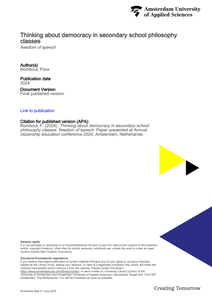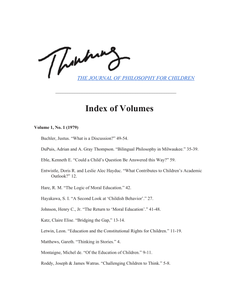Philosophy is an elective subject in secondary education in the Netherlands, which is not often studied in the context of citizenship education. This is probably because only a minority of students participate in philosophy classes in the upper grades of secondary education (approximately 2-5% of all students). However, especially in the years 2022-2025 philosophy is particularly interesting for those studying how citizenship education can be taught, because the higher general track students study a range of philosophical ideas about democracy for their final exams (Spoelstra et al., 2021).This paper presents a qualitative analysis of three philosophy classes about freedom of speech. The lesson transcripts, pre- and post-observation interviews with 3 teachers and 15 students (5 from each class) are coded thematically with a framework for four teacher responsibilities during philosophical discussion in moral education. These four responsibilities are: teachers have an organizational responsibility to facilitate lesson activities such as classroom dialogue to facilitate thinking about democracy, an epistemic responsibility to warrant valid reasoning and recognition of established facts during the lesson, a pedagogic responsibility to create a safe and open classroom climate and a moral responsibility to find the right balance between value communication and stimulation (Leenders & Veugelers, 2004; Rombout et al., 2022; Sprod, 2001). The main research question was: how do philosophy teachers realize these four responsibilities to facilitate their students’ thinking about democracy in a lesson about freedom of speech and how to teacher and students evaluate these responsibilities in this lesson?The findings contain rich descriptions of lesson activities such as considering borderline cases, facilitating teacher-led dialogue, organizing debate, and learning about philosophers’ arguments. These are supplemented with reflections of the participants on teacher neutrality and how open and safe the classroom climate was during these lessons.
DOCUMENT

The journal was a forum for the work of both theorists and practitioners of philosophical practice with children, and published such work in all forms, including philosophical argument and reflection, classroom transcripts, curricula, empirical research, and reports from the field. The journal also maintained a tradition in publishing articles in the hermeneutics of childhood, a field of intersecting disciplines including cultural studies, social history, philosophy, art, literature and psychoanalysis.
DOCUMENT

About the book: This volume has been brought together to generate new ideas and provoke discussion about what constitutes arts education in the twenty-first century, both within the institution and beyond. Art, Artists and Pedagogy is intended for educators who teach the arts from early childhood to tertiary level, artists working in the community, or those studying arts in education from undergraduate to Masters or PhD level. From the outset, this book is not only about arts in practice but also about what distinguishes the ‘arts’ in education. Exploring two different philosophies of education, the book asks what the purpose of the arts is in education in the twenty-first century. With specific reference to the work of Gert Biesta, questions are asked as to the relation of the arts to the world and what kind of society we may wish to envisage. The second philosophical set of ideas comes from Deleuze and Guattari, looking in more depth at how we configure art, the artist and the role played by the state and global capital in deciding on what art education has become. This book provides educators with new ways to engage with arts, focusing specifically on art, music, dance, drama and film studies. At a time when many teachers are looking for a means to re-assert the role of the arts in education this text provides many answers with reference to case studies and in-depth arguments from some of the world’s leading academics in the arts, philosophy and education.
DOCUMENT
In secondary school philosophy classes students learn to reason critically about social and scientific issues. This study examined the effects of a whole-class, teacher-led philosophy classroom dialogue intervention on students’ value-loaded critical thinking. Value-loaded critical thinking is logically consistent, self-reflective reasoning focused on making moral value-judgments about what is right to believe or do. In a quasi-experimental study (N = 437 students) with a pre-test post-test design, we investigated whether engaging in classroom dialogues in which the teachers implemented five design principles for promoting value-loaded critical thinking and transfer thereof, positively affected students’ (n = 150) value-loaded critical thinking in transfer tasks. The results were compared to two comparison conditions: students (n = 149) who participated in regular teacher-led philosophy classroom dialogues and students (n = 145) who followed a regular 10th-grade curriculum without philosophy classes. Results showed that students in the intervention condition outperformed students in both comparison conditions on referring to moral values. Regarding critical reasoning, we only found significant effects compared to the students who followed the regular 10th-grade curriculum. Findings indicate that a specifically designed dialogic intervention can enhance students’ capacities in value-loaded critical thinking.
DOCUMENT

“Municipal Youth Work taken over by Christians”. (Binnenlands Bestuur, 2009) This heading refers to the work of Youth for Christ in an Amsterdam neighbourhood. This organisation, successful in Youth Work nationwide, last year came out first in an open competition of the Amsterdam district De Baarsjes. Because of this they were commissioned to undertake all the youth work in this multicultural neighbourhood. The conditions were not to evangelise and not to limit recruitment of personnel inside their own circle but to recruit from outside the organisation as well. When they later appeared to have put a job advertisement only on their own website, this led to heated debates. Finally Youth for Christ acknowledged and rectified this mistake. This example is a concrete illustration of the actual and sometimes delicate relationships between philosophy of life and social work
DOCUMENT

Background: In order to internalize the midwifery philosophy of care and to learn how to advocate for physiological childbirth, student midwives in the Netherlands need learning experiences that expose them to physiological childbirth practices. Increased hospital births, wide variation in non-urgent referrals and escalating interventions impact on learning opportunities for physiological childbirth. Midwifery educators need to find ways to support student agency in becoming advocates of physiological childbirth. Objective: To gather students’ opinions of what they need to become advocates of physiological childbirth. Methods: Focus groups with student midwives (n = 37), examining attitudes regarding what educational programs must do to support physiological childbirth advocacy. Results: Students reported feelings of personal power when the midwifery philosophy of care is internalized and expressed in practice. Students also identified dilemmas associated with supporting woman-centered care and promoting physiological childbirth. Perceived hierarchy in clinical settings causes difficulties, leading students to practice in accordance with the norms of midwife preceptors. Students are supported in the internalization and realization of the midwifery philosophy of care, including physiological childbirth, if they are exposed to positive examples of care in practice and have opportunities to discuss and reflect on these in the classroom. Key conclusion: Midwifery education should focus on strategies that include navigating dilemmas in practice and helping students to express the midwifery philosophy of care in communication with other professionals and with women. Preceptors need to be supported in allowing student midwives opportunities to realize the midwifery philosophy of care, also when this differs from preceptor practice.
DOCUMENT

Philosophy for Democracy is a research project that aims to examine whether and how Philosophy with Children contributes to the development of democratic skills and attitudes. In the Netherlands, as in almost all Western countries, Philosophy with Children is linked with the movement for citizenship education. This article reports the research on the practice of Philosophy with Children. Sixteen philosophical inquiries by children in the classroom were recorded, transcribed and analysed. The analyses show that children develop relevant reasoning skills and advanced dialogical skills. The study shows that embedding Philosophy with Children in a democratic practice is necessary for contributing to a critical-democratic citizenship development. The study also shows that Dutch children often give their opinion, but are not often involved in inquiring their own opinions. From a pedagogical point of view, we think that in Dutch culture and in Dutch schools it would be important to stress more a dialogical – community-based – inquiring attitude. Om het artikel te lezen moet het gekocht worden: http://tandfonline.com/eprint/rGysRMaKEaXew7veJphB/full
DOCUMENT
Value-loaded critical thinking refers to a combination of critical thinking, moral value development and reflection. It is important to teach value-loaded critical thinking in secondary education and philosophy seems the pre-eminent subject to do so. This article describes the theoretical foundations of value-loaded critical thinking, its educational objectives, and what is known about effective teaching strategies. Value-loaded critical thinking is best taught in teacher-led philosophical dialogues. Four design principles summarize effective teaching strategies for teaching value-loaded critical thinking in dialogue: teachers should (1) explicitly address moral values in dialogue; (2) apply moral values to engaging or realistic examples; (3) promote critical reasoning about moral values; and (4) provide opportunities for reflection.It is important that secondary school students learn to reason critically about normative issues. Philosophy teachers can contribute to this educational objective by promoting value-loaded critical thinking during philosophical dialogues. Value-loaded critical thinking is critical and reflective reasoning focused on deciding what is the right thing to believe or to do (Frijters et al. 2008). This paper describes the theoretical foundations of value-loaded critical thinking and presents four design principles for promoting value-loaded critical thinking during philosophical dialogues. The four design principles are: teachers should explicitly address moral values in dialogue (1), apply moral values to engaging or realistic examples (2), promote critical reasoning about moral values (3), and provide opportunities for reflection (4). To provide authentic illustrations and practical suggestions for teachers, each design principle includes selected excerpts of classroom dialogues of 10th grade philosophy classes in Dutch.
DOCUMENT

Educational policies in the Netherlands reveal that the current mainstream participatory approach to citizenship education jeopardises students’ autonomy. Especially in Dutch post-secondary vocational education, citizenship education has been shown to be mainly aimed at socialization: initiating students into tradition, internalising rules, societal norms and values. This article reports on the findings of a research project, which is grounded in the assumption that integrating Bildung, citizenship education and critical thinking is a promising way to grapple with the perceived overemphasis on socialization strategies. We justify the interrelationship of critical thinking, Bildung, citizenship education, and professional training from two perspectives – historical and contemporary. It is only by combining these concepts, we contend, that educational professionals can create teaching materials more geared to developing autonomy, and prepare students in vocational training to navigate the political and societal dilemma’s on the work floor. Furthermore, we also clarify our perspective by offering three educational principles, used in our project to guide the design of teaching materials, that form a context for integrating citizenship, critical thinking, and Bildung in vocational education. A practical illustration is subsequently discussed.
DOCUMENT

Wanneer je met je lessen specifieke leerdoelen hebt, zoals tactisch inzicht, regelvaardigheden, of samenwerking, dan hoort daar ook een specifieke aanpak bij. De laatste jaren zijn er in de LO, met name in het buitenland, verschillende modellen ontwikkeld die je hierbij kunnen helpen. Deze aanpak wordt ook wel 'Models-Based Physical Education genoemd”.
DOCUMENT
